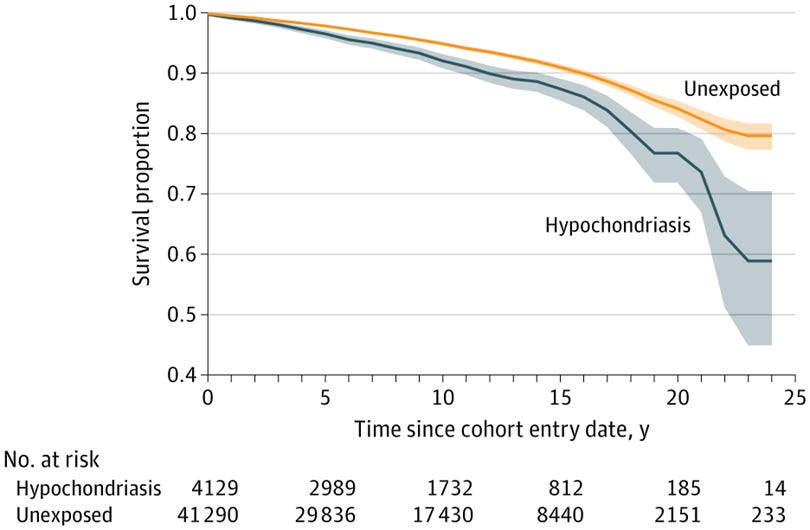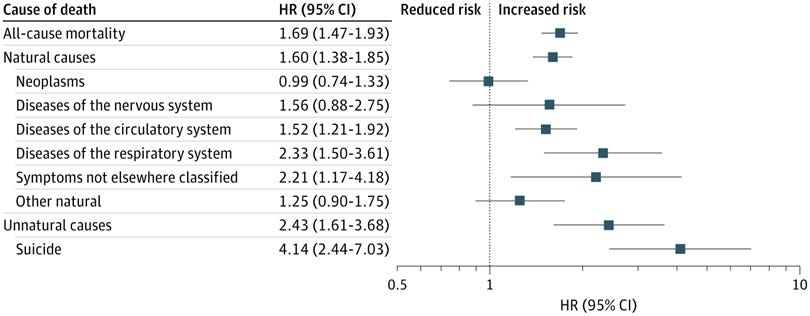The late, great Irish comedian Spike Milligan poked fun at the hypochondriac's morbid obsession with illness and death, by quipping that he wanted the words "I told you I was ill" engraved on his headstone. (His request was finally honoured two years after his death, but only after a compromise was reached with the local church authorities, to render the Chief Goon's epitaph in Gaelic. Apparently God found the joke more offensive in English.)

But, as a team of Scandinavian researchers recently reported, hypochondriasis is no laughing matter. It turns out that having this chronic form of extreme health anxiety is bad for you. Very bad. So bad, in fact, that people diagnosed with hypochondriasis have a 70 per cent higher risk of dying within a given time period, than their more relaxed brethren.
The researchers, from several Swedish, Danish and Norwegian institutions, took advantage of two salient quirks of those scrupulous Swedes:
Firstly, the Swedish version of the International Statistical Classification of Diseases and Related Health Problems, Tenth Revision (ICD-10) includes a separate diagnostic code for hypochondriasis. What exactly is hypochondriasis?
"Hypochondriasis, also known as health anxiety disorder, is a prevalent psychiatric disorder1 characterized by persistent preoccupation about having 1 or more serious and progressive physical disorders.2 The preoccupation is accompanied by hypervigilance and a catastrophic interpretation of bodily signs, resulting in repetitive and excessive checking and reassurance-seeking behavior or maladaptive avoidance. The symptoms are clearly disproportionate and cause significant distress and impairment.3 Hypochondriasis is thought to be severely underdiagnosed due to the condition not being properly recognized or taken seriously by health professionals as well as to the negative connotations associated with the diagnostic label.4,5 However, as a symptom, health anxiety is highly prevalent in health care settings6 and is associated with a substantial use of health care resources.1,4 Hypochondriasis is widely regarded as a chronic disorder, with a low probability of remission without specialized treatment.7,8"
All-Cause and Cause-Specific Mortality Among Individuals With Hypochondriasis
Secondly, each Swedish citizen is assigned a unique national identification number, which facilitated the linking of data from several population-based registers including patient, labour market and cause of death registers, and the census.
Hence, it was possible to identify individuals who had been diagnosed with hypochondriasis, either during a hospital stay or an outpatient consultation with a specialist; determine their age, marital and socioeconomic status, and other physical and mental health diagnoses; and to compare their rates of death from both natural and unnatural causes to those of people who had never had this diagnosis. Specifically, the researchers extracted records of people who had been given a hypochondriasis diagnosis between 1 January 1 1997 and 31 December 2020.
This is how it all shook out:
Diagnosed hypochondriacs died at an average age of 70, a full five years younger than the average age at death of people without hypochondriasis (75.1). The higher risk of death in hypochondriacs was evident from early in the follow-up period, as you can see from Figure 1 below:

As you can see in Figure 2 below, people diagnosed with hypochondriasis were more likely to die of both natural causes (i.e. disease) and unnatural causes (e.g. suicide, homicide or accident).
The most common natural causes of death were circulatory system diseases, respiratory diseases, and “symptoms, signs and abnormal clinical and laboratory findings not elsewhere classified” (a grab bag which mostly includes individuals whose death was due to unknown reasons). Given the deep dread of cancer expressed by many hypochondriacs that I've encountered, it's interesting to note that there was no increased risk of cancer observed in this study. Perhaps hypochondriacs worry so much about getting cancer, that they stress themselves into having a heart attack instead!

You'll note from Figure 2 that the excess risk of death from unnatural causes was higher in people diagnosed with hypochondriasis than excess death from natural causes. The major unnatural cause of death was suicide, which was more than four times more prevalent in people with hypochondriasis.
There were several demographic and socioeconomic covariates that were found to be statistically significantly associated with hypochondriasis, including:
Being born in Sweden, vs being born overseas and emigrating to Sweden;
Having fewer years of education;
Being single; and
Having a lower family income.
Many of the individuals diagnosed with hypochondriasis had also collected other psychiatric diagnoses such as psychotic, bipolar and eating disorders, all of which are associated with increased mortality.
In fact, another recently-published study which examined markers of both brain and body health in people diagnosed with schizophrenia, bipolar disorder, depression or generalised anxiety disorder, found that people with these neuropsychiatric disorders had greater deviations from healthy controls in markers of body health - most notably in their metabolic, hepatic, and immune systems - than in markers of brain health. Astonishingly, the researchers concluded that
"Poor physical health was a more pronounced manifestation of neuropsychiatric illness than brain health."
Evaluation of Brain-Body Health in Individuals With Common Neuropsychiatric Disorders
Hence, the researchers carried out further analyses to try to tease out the effect of hypochondriasis on mortality, from the effects of other comorbid psychiatric conditions. After adjusting for the effects of these other diagnoses, the risks of all-cause mortality and death from any natural causes remained statistically significant, meaning that hypochondriasis raised these risks all by itself. However, after adjusting for depressive and anxiety-related disorders, the risk of death by suicide was no longer statistically significant, suggesting that if a person suffers from hypochondriasis as well as depression and/or anxiety, it's those latter conditions that are likely to drive them to commit suicide rather than their specific health anxiety.
Whilst acknowledging that their study was not designed to identify causal mechanisms linking hypochondriasis and increased mortality, the authors discuss several possibilities.
The first of these possibilities is that some hypochondriacs avoid seeking medical attention for their symptoms, because they are so terrified that they will receive a dire diagnosis. I have encountered a few such clients in my clinical practice. They obsess over every minor alteration in their physical function (more often than not, convinced that it portends cancer), but are strongly resistant to getting any kind of diagnostic test, in case it confirms their fears. The researchers, however, express scepticism that this avoidance could be a major contributor to the increased mortality rate that they found in hypochondriacs, because there was no difference in cancer death rates between hypochondriacs and non-hypochondriacs. I presume they mean that waiting until one's cancer is at an advanced stage before seeking diagnosis and treatment would be expected to increase the risk of dying of cancer. However, as I have discussed in a previous article, Major trial finds screening colonoscopy fails to ‘save lives’, there is little evidence that 'catching cancer early' leads to better treatment outcomes, for the majority of cancer types.
Another possibility is that the chronic stress experienced by hypochondriacs leads to dysregulated hypothalamic-pituitary-adrenal axis function, immune dysfunction and chronic inflammation, which in turn cause physical illnesses that shorten life. Still another is that hypochondriacs may overuse alcohol and other risky substances to try to quell their anxiety. And finally, the researchers propose that "underrecognition of hypochondriasis as a genuine psychiatric disorder that requires treatment, and/or limited access to evidence-based treatment" may drive excess mortality, although they don't propose how this underdiagnosis and undertreatment could actually raise the risk of death.
There is one potential causal mechanism that the researchers fail to mention: hypochondriasis may lead to overdiagnosis and overtreatment. I have seen more clients with hypochondriasis who present for medical attention inappropriately frequently, than those who are inappropriately avoidant. Individuals who consult a doctor every time they experience an ache, pain, minor swelling, unusual sensation, or change in bowel habits, are very likely to end up being prescribed multiple pharmaceuticals, referred for multiple diagnostic tests (some of which carry significant risks), and even undergoing multiple procedures. If no physical cause of their symptoms is identified, the chances of them being prescribed antidepressants are extremely high. And, as I discussed in Dying to feel better, antidepressants increase mortality risk by 33 per cent.
As a health practitioner with an intense interest in mind-body medicine, these findings are absolutely fascinating to me. They bring to mind the Roman poet Juvenal's phrase 'mens sana in corpore sano' - a healthy mind in a healthy body. One interpretation of this maxim is that only a healthy body can produce and support a healthy mind; another is that only a healthy mind can generate a healthy body. Of course, the direction of causality between mind and body health could be circular rather than one-way. That is, morbidly fixating on one's symptoms, and the dire diagnoses they might portend, may actually generate (or exacerbate) the physical illnesses one fears. (See my previous article Rumination inflammation for a discussion of one potential causal mechanism.) And physical illness may in turn negatively affect one's mental function, as reported in the abovementioned study that found worse body health than brain health in people with neuropsychiatric illness.
While hypochondriasis is clearly bad for one's health and longevity, so is completely ignoring one's physical symptoms. I've seen plenty of clients who did this, too. 'Soldiering on' when in pain can result in serious injury. Forcing yourself to keep working through an acute respiratory illness can land you in bed with pneumonia. It is wise to pay attention to physical symptoms; after all, they're the only way that your body can communicate to you that it's experiencing a state of dis-ease.
The difference between health-conscious people who pay appropriate attention to their symptoms, and people experiencing hypochondriasis, is that the former will take corrective action (such as improving their diet, modifying their exercise routine or getting more rest and sleep). The latter instead spin their wheels by obsessively consulting Dr Google, repeatedly darkening their doctors' doorsteps, prodding their lump or checking their temperature over and over again, or engaging in catastrophic thinking about their symptoms. Nothing magnifies anxiety like the failure to take effective action! And conversely, there is no treatment more effective at defusing anxiety than confronting its object, with a well-thought-out plan of concrete action steps.
The authors of the Swedish study emphasise that hypochondriasis is a treatable disorder, and that early treatment is likely to significantly reduce the excess mortality that their study identified. While they emphasise cognitive behavioural therapy, I have also found Emotional Freedom Techniques (EFT), a form of energy therapy with a strong somatic (body-focused) component, to be highly effective for hypochondriasis.
And if all that fails to relieve your anxiety, you could always watch old episodes of The Goon Show to test the theory that laughter really is the best medicine!
Are you a hypochondriac, or do you know one? Have you overcome hypochondriasis? You know what to do:





At Hypochondriacs Anonymous....
The first step is admitting you don't have a problem. Late Merry Christmas & a Happy New Year Robyn.🇦🇺👍
Who said "Laughter is the best medicine" ?